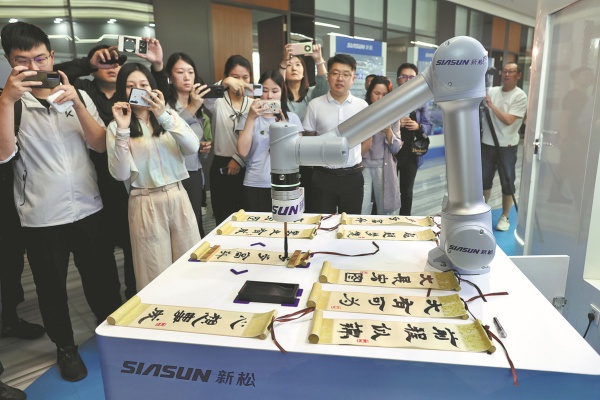
- Home
- Media Center
-
Events
- Wuzhen Summit
- Regional Forums
- Practice Cases of Jointly Building a Community with a Shared Future in Cyberspace
- World Internet Conference Awards for Pioneering Science and Technology
- The Light of Internet Expo
- Straight to Wuzhen Competition
- Global Youth Leadership Program
- WIC Distinguished Contribution Award
- Membership
- Research & Cooperation
- Digital Academy
-
Reports
- Collection of cases on Jointly Building a Community with a Shared Future in Cyberspace
- Collection of Shortlisted Achievements of World Internet Conference Awards for Pioneering Science and Technology
- Reports on Artificial Intelligence
- Reports on Cross—Border E—Commerce
- Reports on Data
- Outcomes of Think Tank Cooperation Program
- Series on Sovereignty in Cyberspace Theory and Practice
- Other Achievements
- About WIC
- 中文 | EN

Siasun cashing in on 'robot plus AI' for cutting-edge solutions
Shenyang-based firm integrates smart tech into more sectors

Visitors observe a Siasun robotic arm performing calligraphy at a company facility in Shenyang, Liaoning province, on June 12. [Photo/China Daily]
Leading Chinese robotics enterprise Siasun Robot and Automation Co Ltd, based in Shenyang, Liaoning province, is exploring rich "robot plus AI" application practices to cultivate and develop new quality productive forces in more specialized application scenarios.
"We'll deeply integrate artificial intelligence with various categories of robots in broader fields and deeper levels," said Han Tianwen, head of Siasun's AI research institute.
The company's exhibition hall in Shenyang showcased a diverse array of cutting-edge intelligent products. Among them, an AI robot can engage in real-time conversational interactions with people and accurately decipher emotions or expectations behind its voice initiator through AI large model technology.
"It is one of the achievements where they deeply integrate collaborative robots with artificial intelligence technology. Empowered by AI, robots are poised to gain a deeper understanding of humanity," Han said.
"Previously, communication with robots necessitated the use of programming languages and the expertise of specialized engineers to facilitate interaction. With these models, interactions have become more direct and intuitive," he added.
Established in 2000, Siasun focuses on robot technology and intelligent manufacturing solutions. The firm has exported products to over 40 countries and regions globally and provided over 4,000 foreign enterprises with industrial upgrade services.
Siasun's presence spans various traditional manufacturing sectors such as petrochemicals, steel, automobiles and light industry. In recent years, the company has expanded its reach beyond manufacturing into sectors such as healthcare, eldercare, emergency rescue and extreme environment applications.
The firm's industrial robots are designed to seamlessly integrate into production lines, utilizing innovative technologies to replicate human-like arm control. Mobile robots within factory settings leverage cutting-edge technologies such as multi-navigation integration, large-scale group control scheduling, and high-precision cargo positioning for intelligent and flexible transport.
Specialized robots featuring advanced technologies like super-redundant robot motion control, high-precision flexible cable transport and reinforcement in high radiation fields are tailored for tasks in high-risk environments like security maintenance, emergency response and operations facing extreme conditions.
Wang Yan, a professor of economics at Shenyang Academy of Governance, said the robotics industry is a prime example of new quality productive forces.
Through a steadfast commitment to high-quality development, Siasun — which has established a comprehensive industry value chain that spans core technologies and components to industry-specific system solutions — exemplifies the seamless integration of technology and industry, said Wang.
Zhang Jin, president of Siasun, said the company will fully unleash the incremental role of robots as core support equipment for intelligent manufacturing, vigorously develop and upgrade advanced productive forces in traditional industries, foster and strengthen advanced productive forces in emerging fields, and lay out and construct advanced productive forces for future industries.
"We will promote the construction of a modern industrial system through value contribution across the entire chain, cultivate and develop new quality productive forces and drive sustainable momentum for high-quality development," he said.

The World Internet Conference (WIC) was established as an international organization on July 12, 2022, headquartered in Beijing, China. It was jointly initiated by Global System for Mobile Communication Association (GSMA), National Computer Network Emergency Response Technical Team/Coordination Center of China (CNCERT), China Internet Network Information Center (CNNIC), Alibaba Group, Tencent, and Zhijiang Lab.





